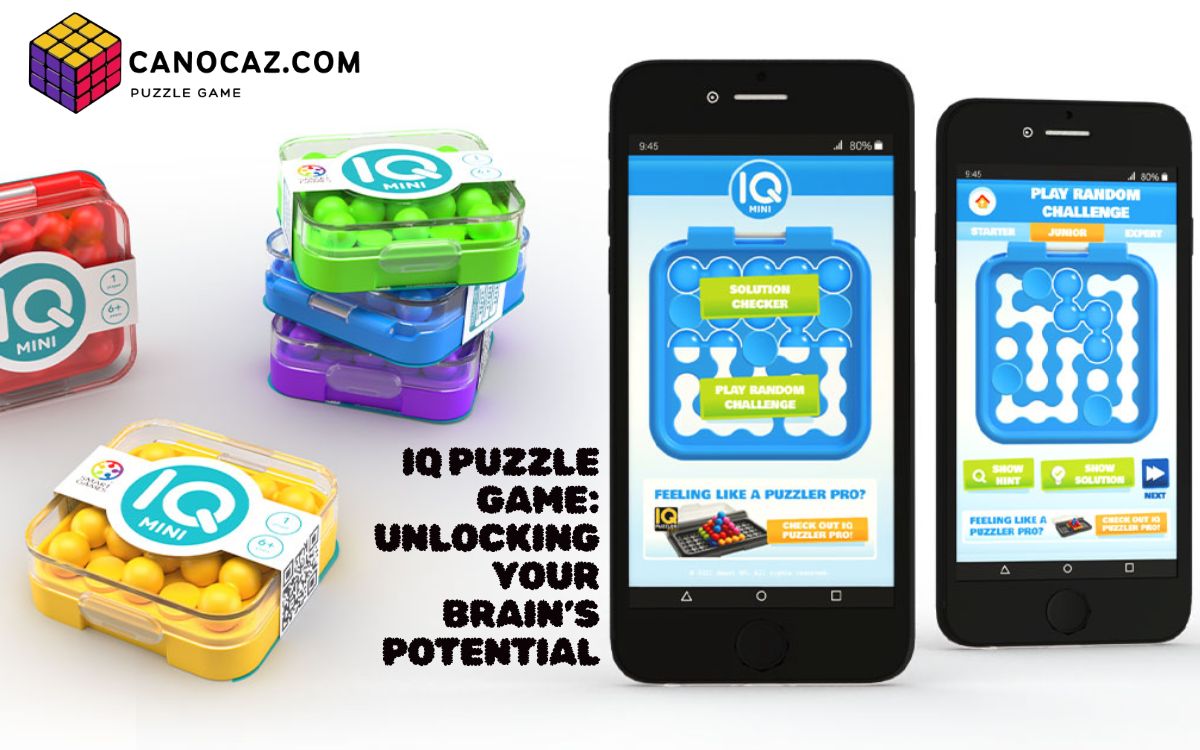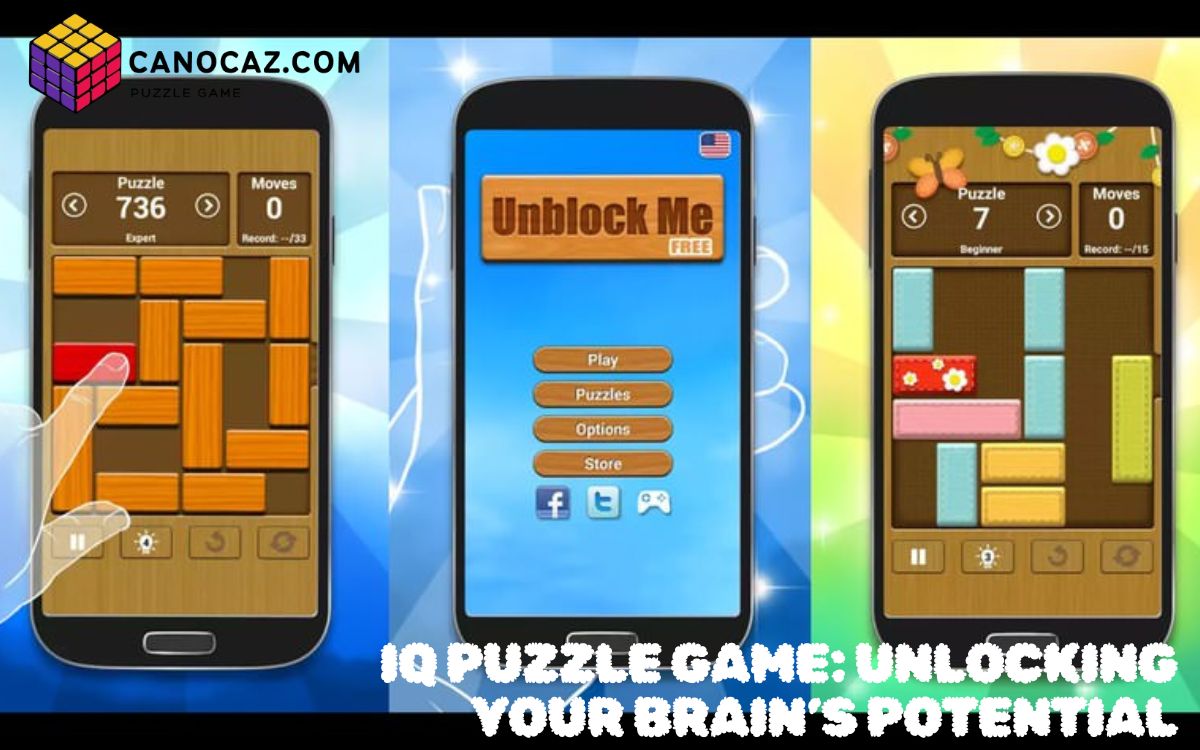Toca Find The Differences
Published on November 20, 2024

IQ puzzle games are a fascinating blend of entertainment and mental exercise, designed to challenge your intellect and problem-solving skills. These games cater to people of all ages, offering an engaging way to sharpen the mind while having fun. In this comprehensive guide, we’ll explore the world of IQ puzzle games, their benefits, popular types, strategies for success, and much more. This content is proudly brought to you by Canocaz.com, your trusted resource for insightful gaming guides and tips.
An IQ puzzle game is a type of brain teaser designed to test and enhance your intellectual abilities. These games involve tasks that require logic, pattern recognition, memory, and problem-solving. Unlike standard video games, IQ puzzle games are structured to stimulate cognitive functions, offering both entertainment and mental growth.
Whether it’s solving a challenging riddle, navigating a maze, or deciphering a complex pattern, IQ puzzle games provide a stimulating experience for players looking to improve their mental agility.
IQ puzzle games are more than just a pastime—they offer a variety of cognitive, emotional, and social benefits. Here’s why these games are worth your time:
Playing IQ puzzle games regularly can enhance your mental capabilities. These games encourage critical thinking, improve memory, and boost problem-solving skills. They challenge you to think creatively and apply logic to overcome obstacles.
Despite their challenging nature, IQ puzzle games can be relaxing. They allow players to focus their attention on solving problems, providing a mental escape from daily stressors. This focus helps create a sense of calm and accomplishment.
IQ puzzle games come in various formats, from mobile apps to physical puzzles and board games. This variety ensures there’s something for everyone, regardless of age or skill level.
Many IQ puzzle games include multiplayer features or team challenges, fostering collaboration and healthy competition among players. Playing with friends or family can be a bonding experience while sharpening your intellect.
IQ puzzle games encompass a wide range of genres, each offering unique challenges. Here are some of the most popular types:
Logical puzzles require reasoning to arrive at the correct answer. Examples include Sudoku, nonograms, and logic grid puzzles.
These games test your ability to identify patterns or sequences. Games like Rubik’s Cube and matching puzzles fall into this category.
Riddles challenge players to think outside the box to solve a question or problem. Brain teasers, such as lateral thinking puzzles, also engage creative thinking.
Memory-based IQ puzzles require players to remember sequences, objects, or patterns. These games help improve recall and attention to detail.
Spatial puzzles involve understanding and manipulating objects in a three-dimensional space. Tetris and tangram puzzles are classic examples.
Mathematical IQ puzzles test numerical reasoning and calculation skills. These puzzles often include equations, number sequences, and logic-based math problems.

IQ Puzzle Game: Unlocking Your Brain’s Potential
Success in IQ puzzle games often comes down to strategy and persistence. Here are some tips to help you excel:
If you’re new to IQ puzzle games, begin with simpler puzzles to build your confidence. As you progress, gradually tackle more challenging ones.
Many IQ puzzle games require time and concentration to solve. Avoid rushing and take the time to analyze the problem before attempting a solution.
For complex puzzles, break them into smaller, manageable parts. Solve each part step-by-step to avoid feeling overwhelmed.
Like any skill, improving at IQ puzzle games requires regular practice. Dedicate time to playing these games consistently to sharpen your skills.
If you’re stuck, don’t hesitate to look for hints or guides. Platforms like Canocaz.com provide valuable insights and strategies to help you overcome difficult puzzles.
Engaging with IQ puzzle games offers numerous benefits beyond entertainment. Let’s explore how these games can positively impact various aspects of your life.
IQ puzzle games stimulate various brain functions, improving memory, focus, and logical reasoning. They encourage players to think critically and approach problems from different angles.
Many IQ puzzles require creative thinking and innovative solutions. This fosters creativity, which can be beneficial in both personal and professional settings.
By teaching players to evaluate situations and consider multiple outcomes, IQ puzzle games enhance decision-making abilities.
Solving puzzles trains the brain to think quickly and adapt to new challenges. This mental agility is particularly valuable in fast-paced environments.
IQ puzzle games are a form of lifelong learning, keeping the brain active and engaged regardless of age.
While IQ puzzle games are rewarding, they can also be challenging. Here are some common obstacles players face and tips to overcome them:
Many puzzles have simple solutions that players overlook by overthinking. Approach problems methodically and avoid making assumptions.
Some puzzles include time limits, which can add pressure. Practice under timed conditions to improve your speed and accuracy.
It’s easy to become frustrated when stuck on a difficult puzzle. Take breaks when needed and return with a fresh perspective.
In some games, players may need specific tools or hints to solve puzzles. Plan ahead to ensure you have the necessary resources.
Carefully analyze all available information before attempting to solve a puzzle. Misinterpreting a clue can lead to unnecessary errors.
The landscape of IQ puzzle games continues to evolve, with advancements in technology offering new opportunities for innovation. From immersive virtual reality experiences to AI-driven personalized challenges, the future looks promising for puzzle enthusiasts.
IQ puzzle games are increasingly being used in educational settings to teach critical thinking and problem-solving skills. This trend is likely to expand as more educators recognize the value of gamified learning.
Developers are incorporating interactive elements, such as touch controls and motion sensors, to make puzzles more engaging and accessible.
Many IQ puzzle games are now available across multiple platforms, ensuring players can enjoy them on their preferred devices.
IQ puzzle games are a captivating way to challenge your mind and develop valuable cognitive skills. From improving memory and focus to fostering creativity and decision-making, these games offer countless benefits for players of all ages.
At Canocaz.com, we’re passionate about helping you explore the world of IQ puzzle games. Whether you’re a beginner looking for guidance or an experienced player seeking advanced strategies, our comprehensive resources are here to support your journey.
Dive into the exciting world of IQ puzzle games and unlock your brain’s full potential!